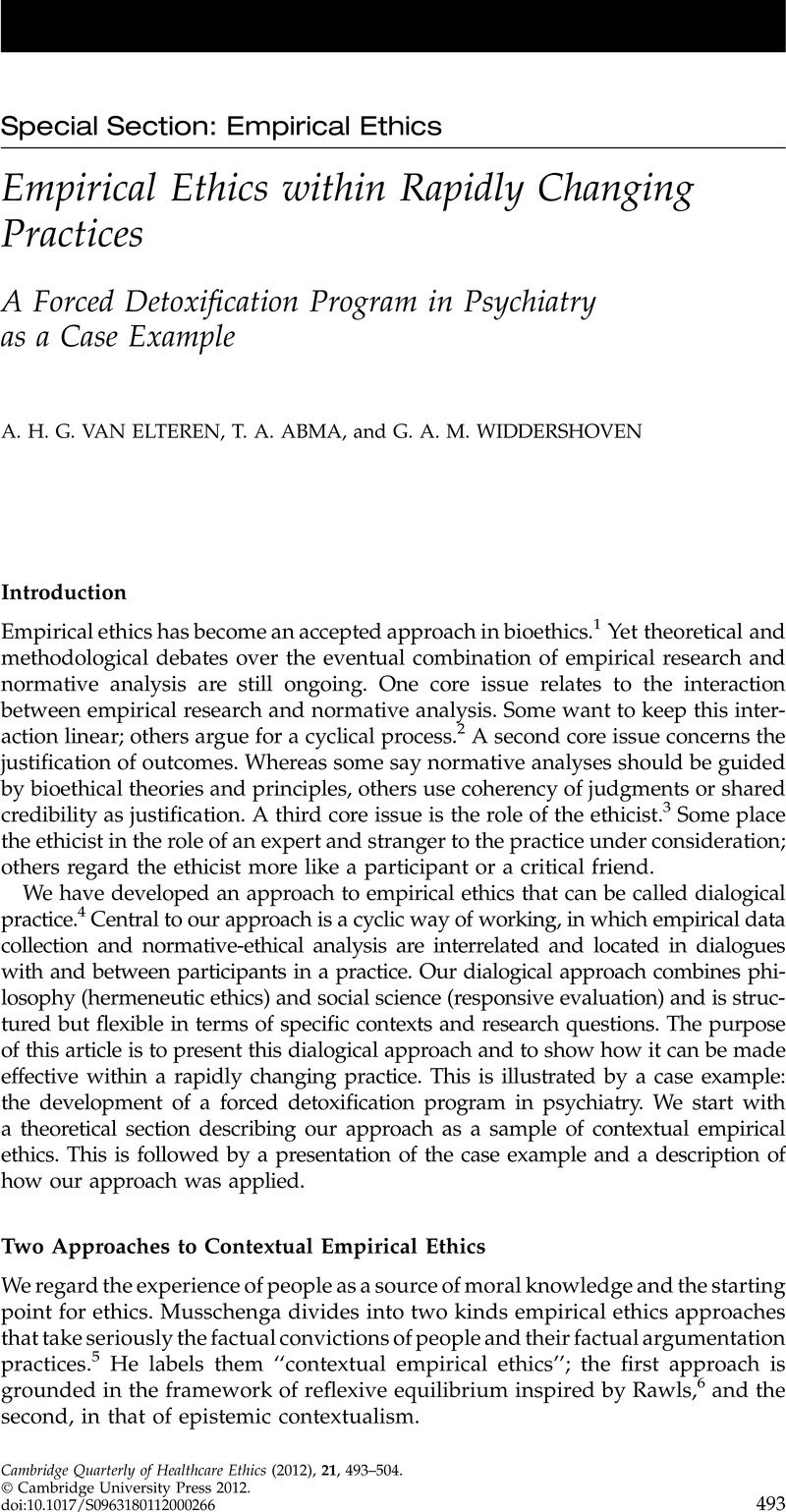Article contents
Empirical Ethics within Rapidly Changing Practices
A Forced Detoxification Program in Psychiatry as a Case Example
Published online by Cambridge University Press: 24 July 2012
Abstract

- Type
- Special Section: Empirical Ethics
- Information
- Copyright
- Copyright © Cambridge University Press 2012
References
Notes
1. Haimes, E.What can the social sciences contribute to the study of ethics? Theoretical, empirical and substantive consideration. Bioethics 2002;16(2):89–113CrossRefGoogle Scholar. Borry, P, Schotsmans, P, Dierickx, K.The birth of the empirical turn in bioethics. Bioethics 2005 Feb;19(1):49–71CrossRefGoogle ScholarPubMed. Goldenberg, MJ.On evidence-based practice and the “empirical turn” from normative bioethics. BMC Medical Ethics 2005 Nov;8(6):E11CrossRefGoogle Scholar. de Vries, R, Gordijn, B.Empirical ethics and its alleged meta-ethical fallacies. Bioethics 2009;23(4):193–201.CrossRefGoogle ScholarPubMed
2. McMillan, J, Hope, T. The possibility of empirical psychiatric ethics. In: Widdershoven, G, McMillan, J, Hope, T, Van der Scheer, L, eds. Empirical Ethics in Psychiatry. Oxford: Oxford University Press; 2008:9–22.CrossRefGoogle Scholar
3. Borry, P, Schotsmans, P, Dierickx, K.What is the role of empirical research in bioethical reflection and decision-making? An ethical analysis. Medicine, Health Care and Philosophy 2004;7(1):41–53.CrossRefGoogle ScholarPubMed
4. Widdershoven, GAM, Abma, TA, Molewijk, B.Empirical ethics as dialogical practice. Bioethics 2009;23(4):236–48.CrossRefGoogle ScholarPubMed
5. Musschenga, B.Empirische Ethiek: Contextsensitiviteit of Contextualiteit? (Empirical ethics: Context-sensitivity or contextuality?) Ethische Perspectieven 2004:14(1):27–42.CrossRefGoogle Scholar
6. Rawls, J.A Theory of Justice. Cambridge, MA: Harvard University Press; 1971.Google Scholar
7. Timmons, M.Morality without Foundations: A Defense of Ethical Contextualism. New York/Oxford: Oxford University Press; 1999.Google Scholar
8. Ten Have, HAJM, Lelie, A.Medical ethics research between theory and practice. Theoretical Medicine and Bioethics 1998;19:263–76.CrossRefGoogle ScholarPubMed
9. Walzer, M.Spheres of Justice: A Defense of Pluralism and Equality. Oxford: Basil Blackwell; 1985.Google Scholar
10. Walzer, M.Interpretation and Social Criticism. Cambridge, MA: Harvard University Press; 1987.Google Scholar
11. Widdershoven, GAM, Abma, TA. Hermeneutic ethics between practice and theory. In: Ashcroft, RA, Dawson, A, Draper, H, McMillan, JR, eds. Principles of Health Care Ethics. West Sussex: Wiley; 2007:215–22.Google Scholar
12. Stake, RE.Standards-Based and Responsive Evaluation. Thousand Oaks, CA: SAGE; 2004CrossRefGoogle Scholar. Guba, EG, Lincoln, Y.Fourth Generation Evaluation. Thousand Oaks, CA: SAGE; 1989.Google Scholar
13. See note 4, Widdershoven et al. 2009.
14. Widdershoven, GAM.Dialogue in evaluation: A hermeneutic perspective. Evaluation 2001;7(2):253–63.CrossRefGoogle Scholar
15. Niessen, TJH, Abma, TA, Widdershoven, GAM, Van der Vleuten, CPM. Learning-in-(inter)action: A dialogical turn to evaluation and learning. In: Ryan, K, Cousins, JB, eds. The SAGE International Handbook of Educational Evaluation. Thousand Oaks, CA: SAGE; 2009:377–95.Google Scholar
16. Gadamer, HG.Wahrheit und Method (Truth and Method). Tubingen: J.C.B. Mohr; 1960, at 289.Google Scholar
17. Koch, T. “Having a say”: Negotiation in fourth generation evaluation. Journal of Advanced Nursing 2000;31(1):117–25.CrossRefGoogle ScholarPubMed
18. See note 12, Guba, Lincoln 1989.
19. Abma, TA, Widdershoven, GAM.Responsieve Methodologie: Interactief Onderzoek in de Praktijk (Responsive methodology: Interactive research in practice). The Hague: LEMMA; 2006Google Scholar. Greene, J, Abma, TA, eds. New Directions for Evaluation 2001;92:7–23Google Scholar. Stake, RE, Abma, TA. Responsive evaluation. In: Mathison, S, ed. Encylopaedia of Evaluation. Thousand Oaks, CA: Sage; 2005:376–9.Google Scholar
20. Schwandt, TA. Whose interests are being served? Program evaluation as a conceptual practice of power. In Mabry, L, ed. Advances in Program Evaluation: Evaluation and the Post-Modern Dilemma. Greenwich, CT: JAI Press; 1997:45–58.Google Scholar
21. Lincoln, YS. I and thou: Method, voice and roles in research with the silences. In: McLaughlin, D, Tierney, W, eds. Naming Silenced Lives. London: Routledge; 1993:29–47Google Scholar. Abma, TA, Widdershoven, GAM.Sharing stories: Narrative and dialogue in responsive nursing evaluation. Evaluation and the Health Professions 2005;28(1):90–109.CrossRefGoogle ScholarPubMed
22. BOPZ stands for Special Admissions in Psychiatric Hospitals.
23. See note 4, Widdershoven et al. 2009.
24. See note 16, Gadamer 1960.
25. Cook, T.The importance of mess in action research. Educational Action Research 1998;6(1):93–108.CrossRefGoogle Scholar
- 4
- Cited by


